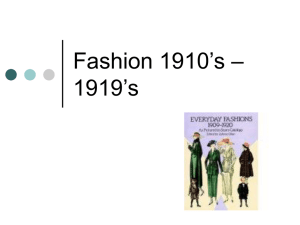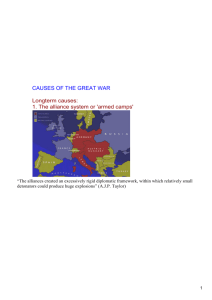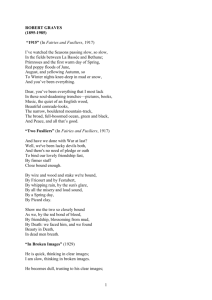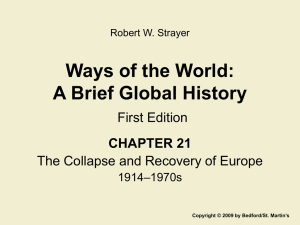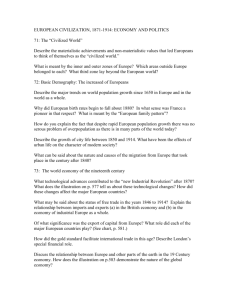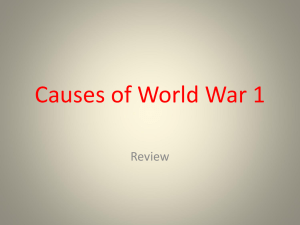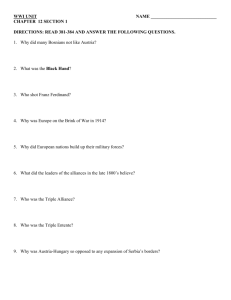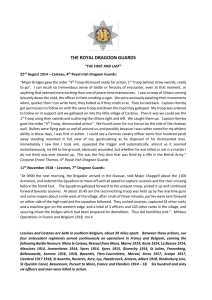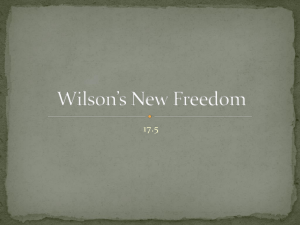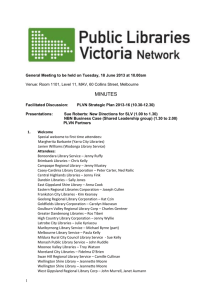WWI poetry
advertisement
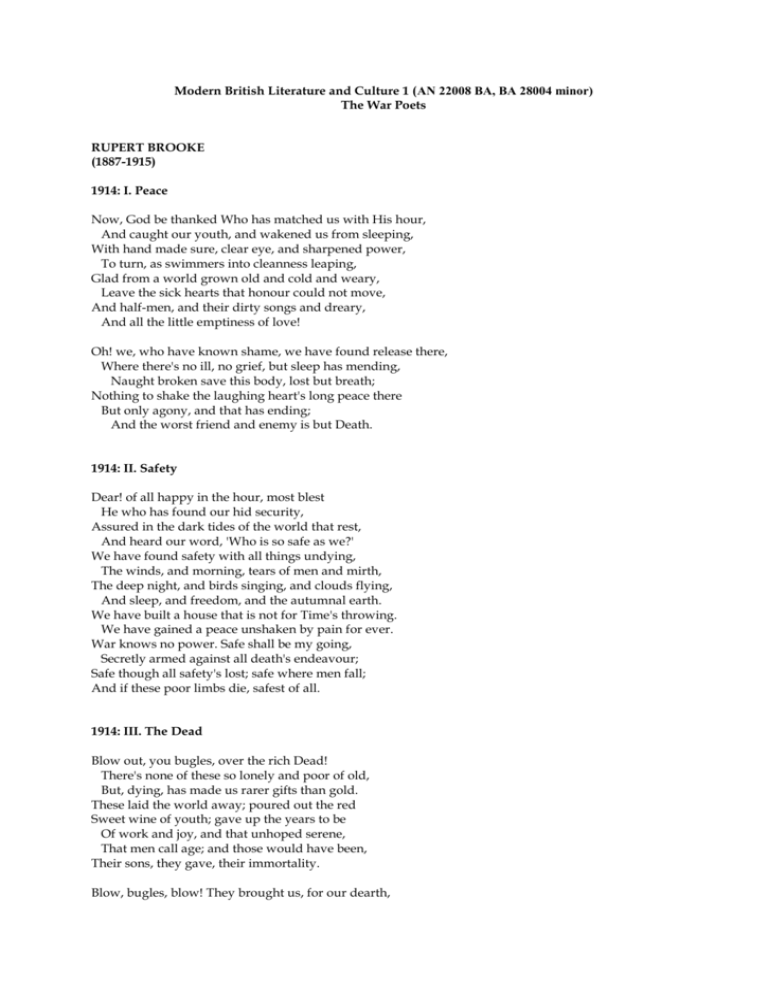
Modern British Literature and Culture 1 (AN 22008 BA, BA 28004 minor) The War Poets RUPERT BROOKE (1887-1915) 1914: I. Peace Now, God be thanked Who has matched us with His hour, And caught our youth, and wakened us from sleeping, With hand made sure, clear eye, and sharpened power, To turn, as swimmers into cleanness leaping, Glad from a world grown old and cold and weary, Leave the sick hearts that honour could not move, And half-men, and their dirty songs and dreary, And all the little emptiness of love! Oh! we, who have known shame, we have found release there, Where there's no ill, no grief, but sleep has mending, Naught broken save this body, lost but breath; Nothing to shake the laughing heart's long peace there But only agony, and that has ending; And the worst friend and enemy is but Death. 1914: II. Safety Dear! of all happy in the hour, most blest He who has found our hid security, Assured in the dark tides of the world that rest, And heard our word, 'Who is so safe as we?' We have found safety with all things undying, The winds, and morning, tears of men and mirth, The deep night, and birds singing, and clouds flying, And sleep, and freedom, and the autumnal earth. We have built a house that is not for Time's throwing. We have gained a peace unshaken by pain for ever. War knows no power. Safe shall be my going, Secretly armed against all death's endeavour; Safe though all safety's lost; safe where men fall; And if these poor limbs die, safest of all. 1914: III. The Dead Blow out, you bugles, over the rich Dead! There's none of these so lonely and poor of old, But, dying, has made us rarer gifts than gold. These laid the world away; poured out the red Sweet wine of youth; gave up the years to be Of work and joy, and that unhoped serene, That men call age; and those would have been, Their sons, they gave, their immortality. Blow, bugles, blow! They brought us, for our dearth, Holiness, lacked so long, and Love, and Pain. Honour has come back, as a king, to earth, And paid his subjects with a royal wage; And Nobleness walks in our ways again; And we have come into our heritage. 1914: IV. The Dead These hearts were woven of human joys and cares, Washed marvellously with sorrow, swift to mirth. The years had given them kindness. Dawn was theirs, And sunset, and the colours of the earth. These had seen movement, and heard music; known Slumber and waking; loved; gone proudly friended; Felt the quick stir of wonder; sat alone; Touched flowers and furs and cheeks. All this is ended. There are waters blown by changing winds to laughter And lit by the rich skies, all day. And after, Frost, with a gesture, stays the waves that dance And wandering loveliness. He leaves a white Unbroken glory, a gathered radiance, A width, a shining peace, under the night. 1914: V. The Soldier If I should die, think only this of me: That there's some corner of a foreign field That is for ever England. There shall be In that rich earth a richer dust concealed; A dust whom England bore, shaped, made aware, Gave, once, her flowers to love, her ways to roam, A body of England's, breathing English air, Washed by the rivers, blest by suns of home. And think, this heart, all evil shed away, A pulse in the eternal mind, no less Gives somewhere back the thoughts by England given; Her sights and sounds; dreams happy as her day; And laughter, learnt of friends; and gentleness, In hearts at peace, under an English heaven. WILFRED OWEN (1893 - 1918) “Dulce Et Decorum Est” (October, 1917-March, 1918) Bent double, like old beggars under sacks, Knock-kneed, coughing like hags, we cursed through sludge, Till on the haunting flares we turned our backs And towards our distant rest began to trudge. Men marched asleep. Many had lost their boots But limped on, blood-shod. All went lame; all blind; Drunk with fatigue; deaf even to the hoots Of tired, outstripped Five-Nines that dropped behind. Gas! GAS! Quick, boys! - An ecstasy of fumbling, Fitting the clumsy helmets just in time; But someone still was yelling out and stumbling, And flound'ring like a man in fire or lime... Dim, through the misty panes and thick green light, As under a green sea, I saw him drowning. In all my dreams, before my helpless sight, He plunges at me, guttering, choking, drowning. If in some smothering dreams you too could pace Behind the wagon that we flung him in, And watch the white eyes writhing in his face, His hanging face, like a devil's sick of sin; If you could hear, at every jolt, the blood Come gargling from the froth-corrupted lungs, Obscene as cancer, bitter as the cud Of vile, incurable sores on innocent tongues, My friend, you would not tell with such high zest To children ardent for some desperate glory, The old Lie: Dulce et decorum est Pro patria mori. “Futility” (May, 1918) Move him into the sun Gently its touch awoke him once, At home, whispering of fields unsown. Always it woke him, even in France, Until this morning and this snow. If anything might rouse him now The kind old sun will know. Think how it wakes the seeds, Woke, once, the clays of a cold star. Are limbs, so dear-achieved, are sides, Full-nerved, - still warm, - too hard to stir? Was it for this the clay grew tall? - O what made fatuous sunbeams toil To break earth's sleep at all? “Anthem for Doomed Youth” (September-October, 1917) What passing-bells for these who die as cattle? - Only the monstrous anger of the guns. Only the stuttering rifles' rapid rattle Can patter out their hasty orisons. No mockeries now for them; no prayers nor bells; Nor any voice of mourning save the choirs, The shrill, demented choirs of wailing shells; And bugles calling for them from sad shires. What candles may be held to speed them all? Not in the hands of boys, but in their eyes Shall shine the holy glimmers of good-byes. The pallor of girls' brows shall be their pall; Their flowers the tenderness of patient minds, And each slow dusk a drawing-down of blinds. “The Parable of the Old Man and the Young” (July, 1918) So Abram rose, and clave the wood, and went, And took the fire with him, and a knife. And as they sojourned both of them together, Isaac the first-born spake and said, My Father, Behold the preparations, fire and iron, But where the lamb for this burnt-offering? Then Abram bound the youth with belts and straps, And builded parapets and trenches there, And stretched forth the knife to slay his son. When lo! an angel called him out of heaven, Saying, Lay not thy hand upon the lad, Neither do anything to him. Behold, A ram, caught in a thicket by its horns; Offer the Ram of Pride instead of him. But the old man would not so, but slew his son, And half the seed of Europe, one by one. “Strange Meeting” (January-March, 1918) It seemed that out of battle I escaped Down some profound dull tunnel, long since scooped Through granites which titanic wars had groined. Yet also there encumbered sleepers groaned, Too fast in thought or death to be bestirred. Then ,as I probed them, one sprang up, and stared With piteous recognition in fixed eyes, Lifting distressful hands, as if to bless. And by his smile, I knew that sullen hall, By his dead smile I knew we stood in Hell. With a thousand pains that vision's face was grained; Yet no blood reached there from the upper ground, And no guns thumped, or down the flues made moan. 'Strange friend,' I said, 'here is no cause to mourn.' 'None,' said that other, 'save the undone years, The hopelessness. Whatever hope is yours, Was my life also; I went hunting wild After the wildest beauty in the world, Which lies not calm in eyes, or braided hair, But mocks the steady running of the hour, And if it grieves, grieves richlier than here. For by my glee might many men have laughed, And of my weeping something had been left, Which must die now. I mean the truth untold, The pity of war, the pity war distilled. Now men will go content with what we spoiled, Or, discontent, boil bloody, and be spilled. They will be swift with swiftness of the tigress. None will break ranks, though nations trek from progress. Courage was mine, and I had mystery, Wisdom was mine, and I had mastery: To miss the march of this retreating world Into vain citadels that are not walled. Then, when much blood had clogged their chariot-wheels, I would go up and wash them from sweet wells, Even with truths that lie too deep for taint. I would have poured my spirit without stint But not through wounds; not on the cess of war. Foreheads of men have bled where no wounds were. I am the enemy you killed, my friend. I knew you in this dark: for so you frowned Yesterday through me as you jabbed and killed. I parried; but my hands were loath and cold. Let us sleep now...' IVOR GURNEY (1890-1937) “Strange Hells” (1920-22) There are strange Hells within the minds War made Not so often, not so humiliating afraid As one would have expected - the racket and fear guns made. One Hell the Gloucester soldiers they quite put out; Their first bombardment, when in combined black shout Of fury, guns aligned, they ducked low their heads And sang with diaphragms fixed beyond all dreads, That tin and stretched-wire tinkle, that blither of tune; "Apres la guerre fini" till Hell all had come down, Twelve-inch, six-inch, and eighteen pounders hammering Hell's thunders. Where are they now on State-doles, or showing shop patterns Or walking town to town sore in borrowed tatterns Or begged. Some civic routine one never learns. The heart burns - but has to keep out of face how heart burns. SIEGFRIED SASSOON (1886–1967) “Wirers” (April, 1919) "Pass it along, the wiring party's going out"-And yawning sentries mumble, "Wirers going out," Unravelling; twisting; hammering stakes with muffled thud, They toil with stealthy haste and anger in their blood. The Boche sends up a flare. Black forms stand rigid there, Stock-still like posts; then darkness, and the clumsy ghosts Stride hither and thither, whispering, tripped by clutching snare Of snags and tangles. Ghastly dawn with vaporous coasts Gleams desolate along the sky, night's misery ended. Young Hughes was badly hit; I heard him carried away, Moaning at every lurch; no doubt he'll die to-day. But _we_ can say the front-line wire's been safely mended. “Enemies” (6th January, 1917) HE stood alone in some queer sunless place Where Armageddon ends. Perhaps he longed For days he might have lived; but his young face Gazed forth untroubled: and suddenly there thronged Round him the hulking Germans that I shot When for his death my brooding rage was hot. He stared at them, half-wondering; and then They told him how I’d killed them for his sake— Those patient, stupid, sullen ghosts of men; And still there seemed no answer he could make. At last he turned and smiled. One took his hand Because his face could make them understand.
